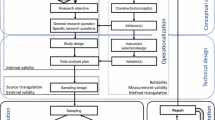Abstract
The issue of sustaining and scaling up professional development for mathematics teachers raises several fundamental issues for researchers. This commentary addresses various definitions for sustainability and scaling up and how these definitions may affect the design of programs as well as the design of research. We consider four of the papers in this issue. Two of the papers describe programs which were designed from the beginning, based on theoretical considerations, to support the possibility of long-term sustainability and scaling up the program. These papers assess the results of those specific aspects of the program which aimed to influence sustainability and scaling up. The other two papers are concerned with viewing programs from a distance and assessing which factors contributed to or hindered sustaining and scaling up the programs. Based on the four papers, factors which promote or impede sustainment and scaling up are examined; these factors include motivation, content, and processes. For example, all four studies incorporated the element of collectivity, some as content, some as processes, and some as both. We address the question of how important this element is for sustainability and scaling up. Factors beyond the program such as the school environment are also reviewed. We question the degree of support necessary for sustainment and scaling up, or even the necessity for system support, and suggest that the influence of this factor may depend on the particular aspect of professional development a teacher chooses to sustain. The inter-relationship between sustainability and scaling up is discussed throughout. We propose a view of sustainability that takes into account a dynamic environment, where an impact is sustained if it continues to flourish, and scaling up can take place if the desired outcome is sustainable.
Similar content being viewed by others
References
Campbell, P. F., & White, D. (1997). Project IMPACT: influencing and supporting teacher change in predominantly minority schools. In E. Fennema & B. Nelson (Eds.), Mathematics teachers in transition (pp. 309–355). Mahwah, NJ: Lawrence Erlbaum.
Clements, D. H., & Sarama, J. (2011). Early childhood teacher education: The case of geometry. Journal of Mathematics Teacher Education, 14(2), 133–148.
Coburn, C. E. (2003). Rethinking scale: Moving beyond numbers to deep and lasting change. Educational Researcher, 32(6), 3–12.
DEZA, Direktion für Entwicklungshilfe und Zusammenarbeit. (2002). Glossar deutsch [German glossary]. Bern, Switzerland: DEZA.
Garet, M. S., Porter, A. C., Desimone, L., Birman, B. F., & Yoon, K. S. (2001). What makes professional development effective? Results from a national sample of teachers. American Educational Research Journal, 38(4), 915–945.
James, P. (2014). Urban sustainability in theory and practice: Circles of sustainability. London: Routledge.
Jaworski, B. (2008). Building and sustaining inquiry communities in mathematics teaching development: Teachers and didacticians in collaboration. In K. Krainer & T. Wood (Eds.), Participants in mathematics teacher education: Individuals, teams, communities, and networks (pp. 309–330). Rotterdam: Sense Publishers.
Jaworski, B., & Huang, R. (2014). Teachers and didacticians: Key stakeholders in the processes of developing mathematics teaching. ZDM - The International Journal on Mathematics Education, 46(2), 173–188.
Kaur, B. (2015). What matters? From a small scale to a school-wide intervention. ZDM - The International Journal on Mathematics Education,. doi:10.1007/s11858-014-0645-4. (this issue).
Koch, L. (1997). The growing pains of change: A case study of a third-grade teacher. In J. Ferrini-Mundy & T. Schram (Eds.), Recognizing and recording reform in a mathematics education project: Insights, issues and implications. Reston, VA: National Council of Teachers of Mathematics. (Journal for Research in Mathematics Education, Monograph 8, 87–109).
Levenson, E. (2013). Exploring Ava’s developing sense for tasks that may occasion mathematical creativity. Journal of Mathematics Teacher Education,. doi:10.1007/s10857-013-9262-3.
Loucks-Horsley, S., Stiles, K., & Hewson, P. (1996). Principles of effective professional development for mathematics and science education: A synthesis of standards. Madison, WI: University of Wisconsin at Madison, National Institute for Science Education.
Moyer, P. S. (2001). Are we having fun yet? How teachers use manipulatives to teach mathematics. Educational Studies in Mathematics, 47(2), 175–197.
Selter, C., Gräsel, C., Reinold, M., & Trempler, K. (2015). Variations of in-service training for primary mathematics teachers: an empirical study. ZDM - The International Journal on Mathematics Education,. doi:10.1007/s11858-014-0639-2.
Tirosh, D., & Graeber, A. (2003). Challenging and changing mathematics teaching classroom practices. In A. J. Bishop, M. A. Clements, D. Brunei, C. Keitel, J. Kilpatrick, & F. K. S. Leung (Eds.), The second international handbook of mathematics education (pp. 643–687). Dordrecht, The Netherlands: Kluwer.
Tirosh, D., Tsamir, P., Levenson, E., Barkai, R., & Tabach, M. (2014). Using video as a tool for promoting inquiry among preschool teachers and didacticians of mathematics. ZDM - The International Journal on Mathematics Education, 46(2), 253–266. doi:10.1007/s11858-013-0563-x.
Tsamir, P., & Tirosh, D. (2009). Affect, subject matter knowledge and pedagogical content knowledge: The case of a kindergarten teacher. In J. Maaß & W. Schlöglman (Eds.), Beliefs and attitudes in mathematics education: New research results (pp. 19–32). Rotterdam, The Netherlands: Sense Publishers.
Weissenrieder, J., Roesken-Winter, B., Schueler, S., Binner, E., & Blömeke, S. (2015). Scaling CPD through professional learning communities: Development of teachers’ self-efficacy in relation to collaboration. ZDM - The International Journal on Mathematics Education, 47(1) (this issue).
Zehetmeier, S. (2015). Sustaining and scaling up the impact of professional development programmes. ZDM - The International Journal on Mathematics Education, 47(1) (this issue).
Author information
Authors and Affiliations
Corresponding author
Rights and permissions
About this article
Cite this article
Tirosh, D., Tsamir, P. & Levenson, E. Fundamental issues concerning the sustainment and scaling up of professional development programs. ZDM Mathematics Education 47, 153–159 (2015). https://doi.org/10.1007/s11858-015-0665-8
Accepted:
Published:
Issue Date:
DOI: https://doi.org/10.1007/s11858-015-0665-8




